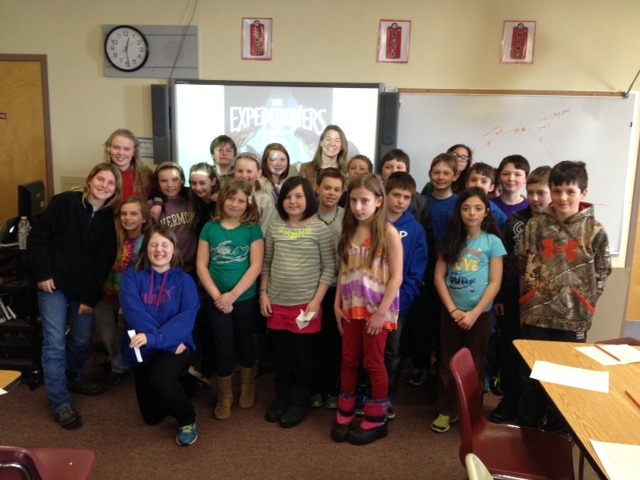Grand Isle Elementary School, Grand Isle, VT
It sounds strange, but when I started writing kids’ books, I didn’t really think about the fact that in order to promote them I would get to spend a lot of time talking about writing and reading with … kids.
Ever since The Expeditioners and the Treasure of Drowned Man’s Canyon was published, I’ve had the privilege of talking about it – and about a lot of other things – in schools and libraries. These visits have given me a profound appreciation for the adults on the literacy frontlines, the librarians who throw book-themed parties and know just the book to press into a reluctant reader’s hands, the teachers who read aloud to their classes at the end of the day, despite the fact that there’s always too much to do, the principals who wear terrible ties or grow beards and cut them when their students reach a reading goal.
Most of all I just love talking with the kids.
I love their questions – “How long did it take you to write a book?” “How old are you?” and “Do you have a dog?” My all-time favorite question came from a kid at a Vermont elementary school who asked me, “How does it feel to have written the Harry Potter books?” He was really disappointed when he discovered that I wasn’t J.K. Rowling.
I love telling them about how uncertain and painful and unpleasant it is to try to write a book. I love telling them how exciting and joyful and thrilling it is to try to write a book. I love telling them that my first drafts are terrible and that I’m terrified that if I die suddenly, my family might open up my first drafts on my laptop and show them to someone. I love telling them that it isn’t until draft number four that I start to love the writing, the job of shaping sentences and building backstories and personalities for my characters.
When you’re a kid, it feels like nobody in your life is ever giving you the full story. The adult world hangs out there like a gray mist on a distant field, just out of reach, hard to see through. I think one of the reasons I became an obsessive reader of fiction when I was 9 or so was that good books felt like windows into that grown-up world, a way to visit it, gawk at the scenery and head home again at the end of the day.
There are lots of good reasons to get young people excited about books and reading. Kids who love stories and books are much more likely to put in the time and hard work it takes to become fluent readers. Kids who think of reading as fun and as an integral part of life are poised to become good writers and deep thinkers.
But lately, I’ve started to think that the whole purpose of authors talking to kids about writing lies in our ability to demystify the process. I tell them about how when I start a book, I have no idea what I’m doing, that I usually want to quit a hundred times before I’m done, that it’s hard, that it isn’t always fun, but that there are moments of pure magic, when the story swims into focus and I can hear my characters’ voices.
I can always feel a collective sense of relief settle over the room when I lay bare my struggles at the computer.
During a recent school visit, the sixth graders were asking me about the writing process and a boy who’d been pretty quiet raised his hand.
“Do you ever get to a point,” he asked. “Where you just don’t really have any idea what comes next?” He looked tired. He was asking about writing, but I think he was asking about life too.
“Oh yeah. All the time,” I told him, nodding as vigorously as I could to show him he wasn’t alone.
“That happens to everybody.”


